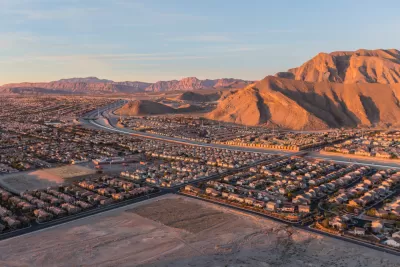Nevada’s explosive growth is creating a severe housing shortage, with the state needing almost 80,000 affordable housing units to meet demand.

“According to an annual report from the National Low Income Housing Coalition (NLIHC) published in April, the Las Vegas-Henderson-Paradise area had 13 affordable housing units available for every 100 extremely low-income household renters who needed them.” Nevada, with 18 affordable units for every 100 low-income renters, has the “most severe” affordable housing shortage in the country, reports Shannon Miller in Las Vegas Weekly. “That’s a shortage of 79,835 affordable and available rental homes for extremely low-income renters across the Silver State, according to the report.”
The article notes that “Nevada also tops the list for highest percentage of extremely low-income households (earning 0% to 30% of area median income, as defined by the U.S. Department of Housing and Urban Development) that are “severely cost burdened,” meaning the household pays more than 50% of its income on housing costs, including utilities,” with 20 percent of Nevada renter households classified as extremely low-income.
Meanwhile, construction of new market-rate housing is booming in the state. “Las Vegas Realtors in March listed the median price for a single-family home at nearly $460,000, a 27% increase from last year. And the Nevada State Apartment Association reported that monthly apartment rents in Southern Nevada rose about 20% from last year, from an average of $1,200 in April 2021 to $1,450 in April 2022.”
“In response to the affordable housing shortage, Clark County in April announced $160 million for a new Community Housing Fund to support affordable housing development,” as well as a plan to fund over 600 affordable units.
FULL STORY: Taking stock of Nevada’s affordable housing shortage—the ‘most severe’ in the nation

Planetizen Federal Action Tracker
A weekly monitor of how Trump’s orders and actions are impacting planners and planning in America.

Map: Where Senate Republicans Want to Sell Your Public Lands
For public land advocates, the Senate Republicans’ proposal to sell millions of acres of public land in the West is “the biggest fight of their careers.”

Restaurant Patios Were a Pandemic Win — Why Were They so Hard to Keep?
Social distancing requirements and changes in travel patterns prompted cities to pilot new uses for street and sidewalk space. Then it got complicated.

Platform Pilsner: Vancouver Transit Agency Releases... a Beer?
TransLink will receive a portion of every sale of the four-pack.

Toronto Weighs Cheaper Transit, Parking Hikes for Major Events
Special event rates would take effect during large festivals, sports games and concerts to ‘discourage driving, manage congestion and free up space for transit.”

Berlin to Consider Car-Free Zone Larger Than Manhattan
The area bound by the 22-mile Ringbahn would still allow 12 uses of a private automobile per year per person, and several other exemptions.
Urban Design for Planners 1: Software Tools
This six-course series explores essential urban design concepts using open source software and equips planners with the tools they need to participate fully in the urban design process.
Planning for Universal Design
Learn the tools for implementing Universal Design in planning regulations.
Heyer Gruel & Associates PA
JM Goldson LLC
Custer County Colorado
City of Camden Redevelopment Agency
City of Astoria
Transportation Research & Education Center (TREC) at Portland State University
Camden Redevelopment Agency
City of Claremont
Municipality of Princeton (NJ)





























